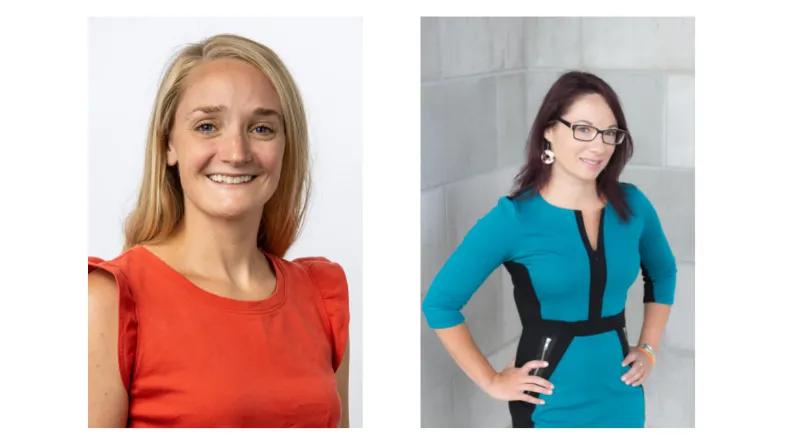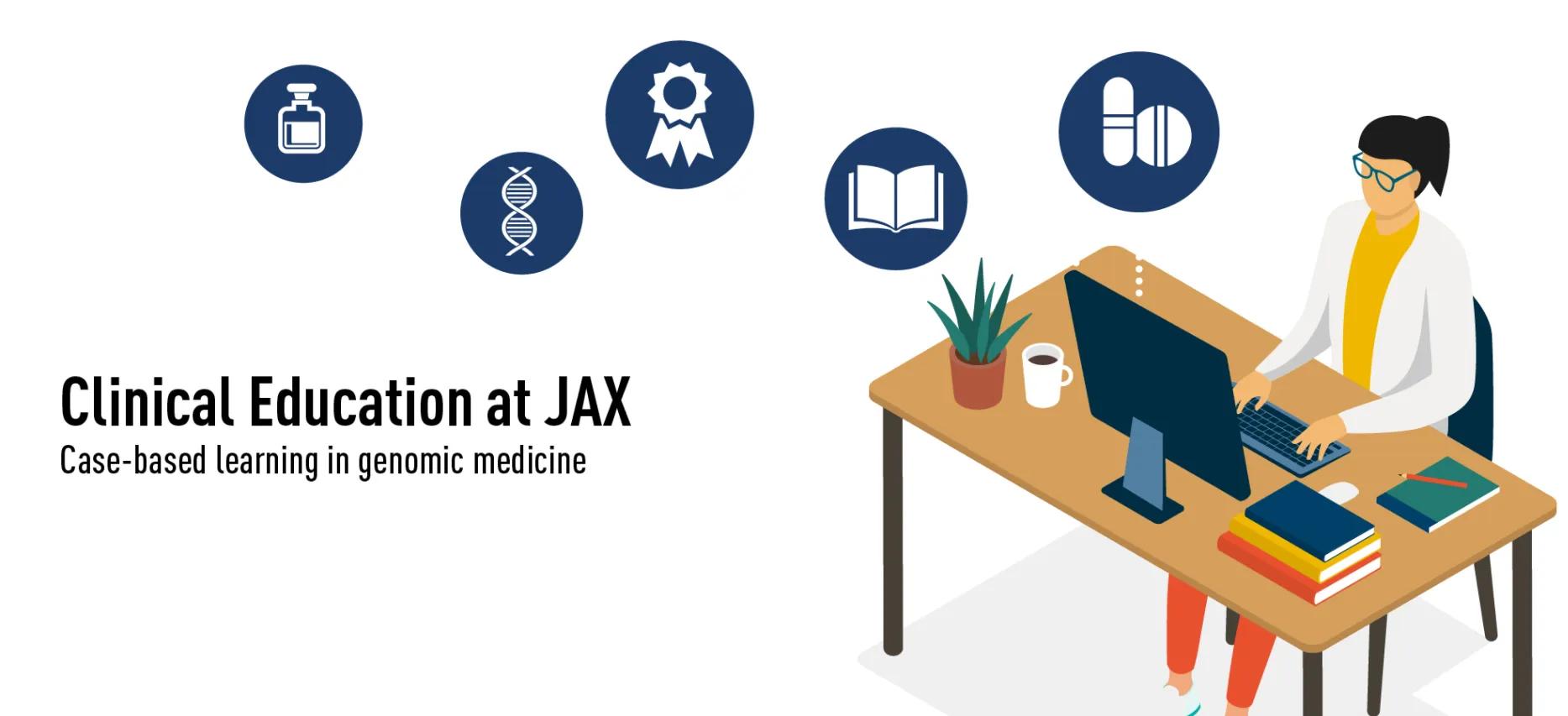Your quarterly update from the MCGI team April—June 2021
Your quarterly update from the MCGI team April—June 2021

MCGI has moved into the second phase of the initiative and we’ve advanced our mission of expanding access to precision oncology and increasing actionability of genomic tumor testing. Two new MCGI team members, Associate Director Leah Graham, Ph.D. (pictured left), and Genomic Navigator Lindsey Kelley, M.P.H., M.S., CGC (pictured right), will play a critical role in supporting our expanded offerings for the Maine clinical oncology community. We are excited to welcome Leah and Lindsey to the MCGI team and are pleased to share some insights on their roles, backgrounds and ideas for the future.
To get to know Leah and Lindsey better, we asked them the following questions:
1. What is your current role at The Jackson Laboratory?
Leah – I am the associate director for the Maine Cancer Genomics Initiative at JAX. My role in MCGI is to lead the advancement of grant applications and scientific management of publications. I also focus on expanding the clinical trial opportunities available to our network of clinicians and manage collaborative relationships for the initiative.
Lindsey – I am the Genomic Navigator for the Maine Cancer Genomics Initiative at JAX. In this role, I will be facilitating access to genomic testing and providing therapy navigation guidance for the oncology practices involved in MCGI.
2. Tell us about your career path and what led you to join the MCGI team.
Leah – I consider myself to be a basic biomedical researcher who is passionate about communicating science to many audiences. I received my Ph.D. in genetics from Tufts University in 2017 and have always been interested in the intersection of research science and medicine. After working at the bench for a number of years, I decided to take a position in science advocacy, where I learned a lot of communication and coalition-building skills to support biomedical research science. That position enabled me to build a large network both in Maine and nationally. When my current position opened on the MCGI team, I was excited to apply and use a combination of my scientific knowledge and communication and relationship-building expertise.
Lindsey – I began my career in research at UConn Health, where I worked with Dr. Nancy Petry and Dr. William White on clinical trials for substance use interventions. I then went on to be a program manager for the State of Connecticut Department of Public Health, working on injury and violence prevention initiatives statewide. After learning about a career in genetic counseling, I decided to go back to school for my master’s degree and moved to Maine to practice genetic counseling in oncology at Maine Medical Center. When the genomic navigator position within MCGI opened at JAX, I knew it would be the perfect fit for me. I am excited to combine my past experience in program management and research, along with my passion for genomics and expanding access to care.
3. What inspired you to pursue a career in the field of biomedical research?
Leah – I was inspired by the idea of discovering why something occurs in biology. I am motivated by scientists discovering new things and theories across many different fields. Also, when I was doing my undergraduate research, I was fascinated by genetics; specifically, how genetics and the environment combine in different ways to cause disease. There continues to be a lot to learn!
Lindsey – I have always been interested in the field of biomedical research because it is the heart of medical breakthroughs. My interests have changed over time from substance use treatment, to violence prevention and now to cancer treatments, but I have always felt that research is the impetus to understanding and providing solutions to all of these conditions.
4. What sparked your interest in science and health care?
Leah – As I said earlier, I have always been interested in the intersection between biomedical bench research and clinical practice and there tends to be a large gap between the two fields. It takes years, if not decades, to bring preventions and treatments to patients. I have always wanted to use my expertise and knowledge to bridge that gap. It’s why MCGI is a great place to work. We are working to shorten that gap, which made joining the team so appealing.
Lindsey – Science has always been a passion of mine because our understanding of it is ever evolving and I enjoy learning and discovering new things. I chose health care as my career path because it is a practical way to meld an interest in science with a passion for wanting to help people.
5. Have mentors played a role in your career development?
Leah – Absolutely, I think about my previous and current mentors every day. I have been incredibly lucky to have had supportive and expert mentors; some of whom have been formal and some non-formal. I consider both my academic mentors and my managers to be instrumental in my ongoing development.
Lindsey – I have had countless mentors that have played a role in my career development, but two that stick out are my high school social studies teachers, Mr. Carlson and Mr. Herrington. These teachers encouraged me to be passionate about learning, to think critically and to not accept all information as it is presented. Their mentoring led me to an interest in research as a career.
6. What excites you the most about MCGI and its future?
Leah – I’m excited to make a difference in rural health care. I believe that everyone should have access to quality and current treatments — it should not matter where you live. MCGI is doing wonderful things to enable further access to precision oncology.
Lindsey – MCGI is connecting oncology providers in the state of Maine to ensure access to precision medicine for every cancer patient. I am excited to continue to serve every oncology practice here, and to learn from the initiative to help others implement similar strategies to expand their oncology networks and access to care.
7. What inspires you each day while working on MCGI?
Leah – Knowing that our work is impacting people and their disease treatment. Also, working with a group of people who really care about their work.
Lindsey – The team at MCGI inspires me each day I am at work. Every person here is dedicated to expanding access to cutting-edge cancer treatments throughout the state of Maine, and they are all so passionate about what they do.
8. Why is the MCGI team’s work important to Maine, JAX and people living with cancer?
Leah – The work being done by MCGI is important to Maine and people living with cancer because the initiative is equalizing the care given to cancer patients across a geographically diverse state. We are also at a point where we are bringing innovative clinical trials to Maine that would be much harder to access without MCGI. For JAX, I think MCGI is important because it is the first program directly influencing patient care through innovation research and novel treatments. This is a small but mighty example of how impactful novel biomedical research can be on patient care outside of an academic medical setting.
Lindsey – Access to care has always been an important issue to me and I believe that it is very important in the most rural state in the nation. MCGI is ensuring that every cancer patient in Maine has access to the most up-to-date precision medicine, regardless of their location.
9. What do you enjoy doing in your time outside of work?
Leah – I am most commonly found outside when I’m not at work. I love hiking, backcountry camping, swimming, gardening and lounging in the yard with our pets while reading books. I also really enjoy baking and cooking for my family and friends.
Lindsey – I am relatively new to living in Maine, so in my free time I try to explore the state as much as possible. I like to go on hikes with my dog, bike ride around town, and I am getting into kayaking and skiing. I also enjoy cooking, lifting weights and catching as many live concerts, sporting events and comedy shows as I can.
On May 3, we received approval for the study protocol — The Maine Cancer Genomics Initiative 2.0: A study of oncology clinician and patient experiences with clinical genomics in northern New England. The approval of this protocol empowers us to continue our goal of evaluating critical physician and patient-related factors that affect the implementation of precision oncology.
Key features of the protocol will include three cohorts of physician participants: cohort A, enrolling up to 120 oncology physicians and patient participants, cohorts B1 and B2, enrolling up to 3,200 oncology patients. Enrolled patients will participate for a one-year period and have the opportunity to take part in an optional survey study and/or an optional registry study. During the course of their six-year enrollment, physicians will be evaluated to determine the impact of educational and decision-support activities within MCGI 2.0.
Next steps include approval of budgets and clinical trials agreements between MCGI and the business office at your site. In addition, sites must be added to the study protocol via JAX IRB. MCGI staff recently issued onboarding documents to contacts at each participating practice.
Please contact [email protected] with any questions or concerns.

The Clinical Education team has released a new case-based educational module offering CME and nursing CE. The module focuses on helping oncologists and other cancer clinicians select the most appropriate genomic tumor test for their patients. The module is appropriate for both practicing clinicians and students.
Choosing the Best Genomic Tumor Test — Free online CME/CNE course
Germline or somatic, broad or targeted, tumor tissue or liquid biopsy — which test is best for which patient? Practice comparing genomic test options by working through seven interactive case studies.